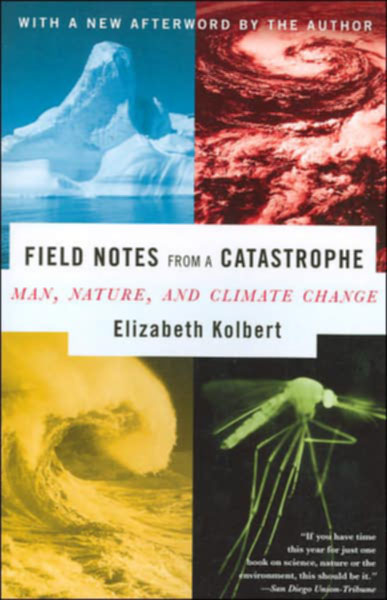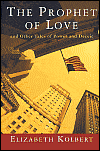 |
 |
| Second Annual UAlbany Reading Project, Spring 2007 Sponsored by the Office of the Provost  |
Journalist for the New Yorker since 1999 Elizabeth Kolbert
March 29, 2007 |
Elizabeth Kolbert, award-winning journalist, is the author of "Field Notes from a Catastrophe: Man, Nature, and Climate Change" (2006, Bloomsbury, ISBN 13-978-1-59691-125-3). The new book, which has drawn innumerable comparisons with Rachel Carson's "Silent Spring," grew out of a widely influential three-part series of articles Kolbert wrote on global warming that was published in the "New Yorker." In order to write the book, Kolbert spent time with top climate scientists in Alaska and Greenland measuring the growing impact of climate change. She presents the science of global warming in clear, unbiased, readable prose, and offers personal tales told by people most affected by the sudden changes, from Inuit hunters to Dutch policy makers working to rescue their below-sea-level nation.
"A riveting view of the apocalypse already upon us. Kolbert mesmerizes with her poetic cadence as she closes the coffin on the arguments of the global warming skeptics." - Robert F. Kennedy, Jr.
"Kolbert's calmly persuasive reporting stands out for its sobering clarity . . . this unbiased overview is a model for writing about an urgent environmental crisis." - "Publishers Weekly" (starred review)
"The hard, cold, sobering facts about global warming. Kolbert's Field Notes from a Catastrophe is nothing less than a Silent Spring for our time." - T.C. Boyle, author of Drop City

Kolbert is a staff writer at the "New Yorker," and formerly wrote for the "New York Times" for fifteen years, serving as Albany Bureau Chief (1988-91), covering the national elections in 1992 and 1996, and writing the "Metro Matters" column. She is a recipient of the George Polk Award and Walter T. Brown Award for journalism.
Kolbert's first book was "The Prophet of Love: And Other Tales of Power and Deceit" (2004), a collection of profiles of New York political figures including Boss Tweed, Sheldon Silver, Charles Rangel, George Pataki, Hillary Clinton, Al Sharpton, Rudy Giuliani, and Michael Bloomberg.
"observant, quicksilver explorations of the Big Apple's political landscape." - "Kirkus Reviews"
Kolbert writes extensively about Albany, where she lived and worked for more than three years, in "The Prophet of Love." In the introduction, she writes, "In principle, Albany is a state capital much like any other, with struggles that are no more or less edifying; as a practical matter, anyone who has ever spent much time there knows different. (William Kennedy, Albany's Virgil, who has described the city as 'a state of mind,' notes that 'wickedness has been our lot for more years than any man alive can remember.')."
Kolbert will speak in conjunction with the UAlbany Reading Project, a program to engage the entire University community in reading and reflecting on a common text. "Field Notes from a Catastrophe" is the featured work.
Elizabeth Kolbert was also a guest of the NYS Writers Institute on April 18, 2006.
CLIMATE TIMELINE 1769: James Watt patents his steam engine.
Atmospheric CO2 levels are ~ 280 parts per million.1859: John Tyndall builds the world's first ratio spectrophoto-meter and tests the absorptive properties of atmospheric gases.
1895: Svante Arrhenius completes his calculations on varying CO2 levels.
Atmospheric CO2 levels ~ 290 parts per million1928: CFCs are invented.
1958: CO2 measuring equipment is installed at the Mauna Loa Observatory.
1959: CO2 levels stand at 315 parts per million
1970: Paul Crutzen warns that human actions may damage ozone layer.
1979: The National Academy of Sciences issues its first major report on global warming: "We may not be given a warning until the CO2 loading is such than an appreciable climate change is inevitable."
CO2 levels reach 337 parts per million.1987: The Montreal Protocol is adopted; phase out of CFCs begins.
1988: The Intergovernmental Panel on Climate Change is established by the World Meteorological Organization and the United Nations Environment Programme.
1992: President George H. W Bush signs the U.N.. Framework Convention on Climate Change in Rio de Janeiro.
The U.S. Senate approves the Framework Convention by unanimous consent.
CO2 levels reach 356 parts per million.1995: The Intergovernmental Panel on Climate Change issues its Second Assessment Report: "The balance of evidence suggests a discernible human influence on global climate."
1997: The Kyoto Protocol is drafted.
1998: Average global temperatures for the year are the warmest on record.
2000: Presidential candidate George W Bush calls global warming an "issue that we need to take very seriously."
CO2 levels measured at 369 parts per million.2001: The IPCC issues Third Assessment report: "Most of the warming observed over the last fifty years is attributable to human activities."
A report by the National Research Council requested by President Bush states, "Greenhouse gases are accumulating in Earth's atmosphere as a result of human activities, causing surface air temperatures and subsurface ocean temperatures to rise. Temperatures are, in fact, rising."
President Bush announces that the U.S. is withdrawing from the Kyoto Protocol.
Third warmest year on record.2002: Larsen B ice shelf collapses.
Second warmest year on record, tied with 2003.2003: Senator James Inhofe, chairman of the Committee on Environment and Public Works, says he has "compelling evidence that catastrophic global warming is a hoax."
The American Geophysical Union issues a consensus statement asserting: "Natural influences cannot explain the rapid increase in global near-surface temperatures."
CO2 levels reach 375 parts per million2004: Kyoto Protocol is ratified by Russia
Fourth warmest year on record2005: Extent of melt on the Greenland ice sheet reaches a record maximum.
Arctic sea ice reaches a record minimum; researchers warn sea could be ice-free in summer "well before the end of this century."
Kyoto Protocol goes into effect.
The National Academies of Sciences of the eight major industrialized nations issue a joint statement: "The scientific understanding of climate change is now sufficiently clear to justify nations taking prompt action."
[an error occurred while processing this directive]
Sunday Gazette Article
An Inconvenient Truth
StopGlobalWarming.org
Sunday Times Union Article
Writers Online Magazine Article